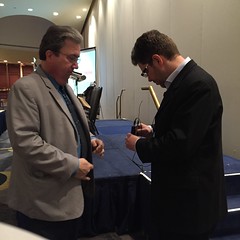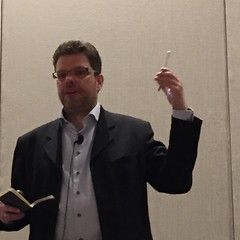 |
| Bill Spence and Jan Holmquist |
Jan Holmquist - Guldborgsund Public Library
Being from Denmark, Jan started off with a short fairy tale about mobile 23 things.
Mobile 23 things began in his library and had spread around the world. Holmquist noted that we have the same challenges in libraries globally.
The losers of the future are the people who cannot unlearn and relearn. People need to be able to hack their own learning.
Basic library skills: To be aware of and be able to adapt to changes in society surrounding the library.
They did "23 things" and then got questions about other (mobile) technologies. Choosing just 23 was hard. They were purposeful in how they selected the apps.
"He who wants the world to remain as it is doesn't want it to remain at all." - unknown
The project had one blog. They used professional development money to buy iPad minis for staff. The project was for all staff. They used Twitter for communication and discussion. They also hosted a "support cafe."
Findings - most important was that staff saw a need for applications on a table device as being a way to enhance library services. Michael Stephens did a survey (to learn the findings) and had published the findings.
They are now working in a version of the Guldborgsund.
Global versions in USA, Australia, New Zealand, France, Germany, Russia, Norway, and more. Without the ability to control the mobile environment, people need a bit more skills before starting the program. New versions build upon previous versions and so keep getting better.
23mobilethings.net includes links to other versions. Global project used one blog, used Twitter for support/communication/discussion, some hangouts for discussion topics, and a lot of emails.
Different from a MOOC:
 |
| Jan Holmquist |
- Less structured
- Everyone can join
- Self paced
- You can pick and choose your things
- There are no exams
- Harder to belong to a study group
23 things allows people to face their fears and to be comfortable with being uncomfortable. It also helps people to connect across library systems.
A thing has an introduction, the a discovery task, a way to explore (learn more), and a time to reflect (thinking points).
Key learnings:
- A way to sharpen our skills
- Connect with librarians worldwide
- Steal ideas from other libraries
- Hope our communities get smarter
No comments:
Post a Comment